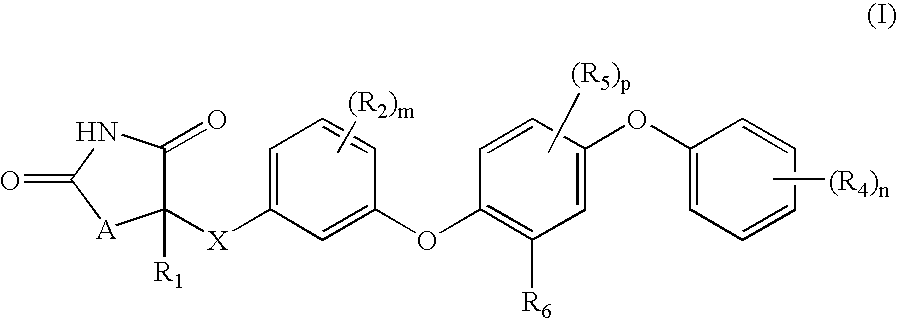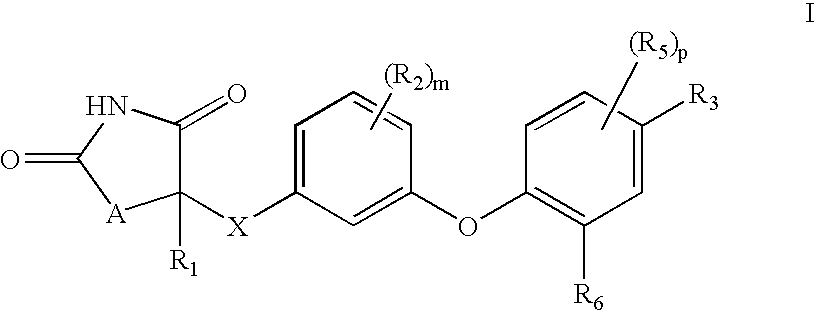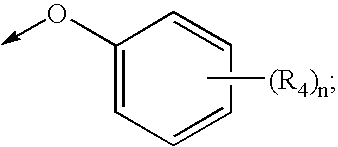Antidiabetic oxazolidinediones and thiazolidinediones
- Summary
- Abstract
- Description
- Claims
- Application Information
AI Technical Summary
Benefits of technology
Problems solved by technology
Method used
Image
Examples
example 1
(5R)-5-{3-[4-(4-Chlorophenoxy)-2-propylphenoxy]phenyl }-5-methyl-1,3-oxazolidine-2,4-dione
[0176]
Step 1. Preparation of methyl (2R)-2-{3-[4-(4-chlorophenoxy)-2-propylphenoxy]phenyl}-2hydroxypropionate
[0177] A mixture of intermediate 1 (2.6 g, 10 mmol), intermediate 9 (3.9 g, 15 mmol), palladium acetate (90 mg, 0.04 mmol), di(t-butyl)(2-biphenyl)phosphine (179 mg, 0.06 mmol) and potassium phophate (4.2 g, 20 mmol) in toluene (30 mL) was degassed and heated under N2 at 100° C. for 16 h. The reaction mixture was diluted with ether (50 mL) and filtered through a short path of silica gel to give the crude title product, which was used directly for the next step.
Step 2. Preparation of (2R)-2-{3-[4-(4-chlorophenoxy)-2-propylphenoxy]phenyl}-2-hydroxypropionamide
[0178] A solution of the crude product from step 1 in methanol (35 mL) was cooled to 0° C. and saturated with ammonia gas. The solution was kept at 25° C. for 2 days and then concentrated. The residue was chromatographed on sili...
example 2
(5R)-5-{3-[4-(4-methoxyphenoxy)-2-propylphenoxy]phenyl }-5-methyl-1,3-oxazolidine-2,4-dione
[0181]
[0182] The title compound was prepared following the same procedure as described for Example 1, steps 1 through 3, substituting intermediate 10 for intermediate 9 in step 1.
[0183]1H NMR (600MHz, CD3OD) δ 7.26 (t, J=7.8 Hz, 1H), 7.19 (d, J=7.8 Hz, 1H), 7.07 (t, J=1.8 Hz, 1H), 6.94 (dd, J=8.4 Hz, 2.4 Hz, 1H), 6.93 (d, J=12.0 Hz, 2H), 6.91 (dd, J=7.2 Hz, 1H), 6.83 (d, J=3.6 Hz, 1H), 6.82 (d, J=1.8 Hz, 1H), 6.74 (dd, J=8.4 Hz, 2.4 Hz, 1H), 6.72 (dd, J=8.0 Hz, 3.0 Hz, 1H), 3.77 (s, 3H), 2.47 (t, J=7.8 Hz, 2H), 1.69 (s, 3H), 1.54 (m, 2H), 0.87 (t, J=7.8 Hz, 3H). MS (ESI, m / z): 447.9 (M+1).
example 3
(5R) -5-{3-[5-Fluoro-4-(4-methoxyphenoxy)-2-propylphenoxy]phenyl}-5-methyl-1,3-oxazolidine-2,4-dione
[0184]
[0185] The title compound was prepared following the same procedure as described for Example 1, steps 1 through 3, substituting intermediate 11 for intermediate 9 in step 1.
[0186]1H NMR (500 MHz, CD3OD) δ7.44 (t, J=8.0 Hz, 1H), 7.27 (d, J=7.5 Hz, 1H), 6.97 (d, J=9.0 Hz, 2H), 6.96 (d, J=8.0 Hz, 1H), 6.941 (s, 1H), 6.940 (s, 1H), 6.93 (m, 1H), 6.83 (d, J=12 Hz, 1H), 3.80 (s, 3H), 2.50 (t, J=7.5 Hz, 2H), 1.88 (s, 3H), 1.55 (m, 2H), 0.88 (t, J=7.5 Hz, 3H). MS (ESI, m / z): 465.0 (M+1).
PUM
| Property | Measurement | Unit |
|---|---|---|
| Pharmaceutically acceptable | aaaaa | aaaaa |
Abstract
Description
Claims
Application Information
 Login to View More
Login to View More - R&D
- Intellectual Property
- Life Sciences
- Materials
- Tech Scout
- Unparalleled Data Quality
- Higher Quality Content
- 60% Fewer Hallucinations
Browse by: Latest US Patents, China's latest patents, Technical Efficacy Thesaurus, Application Domain, Technology Topic, Popular Technical Reports.
© 2025 PatSnap. All rights reserved.Legal|Privacy policy|Modern Slavery Act Transparency Statement|Sitemap|About US| Contact US: help@patsnap.com



